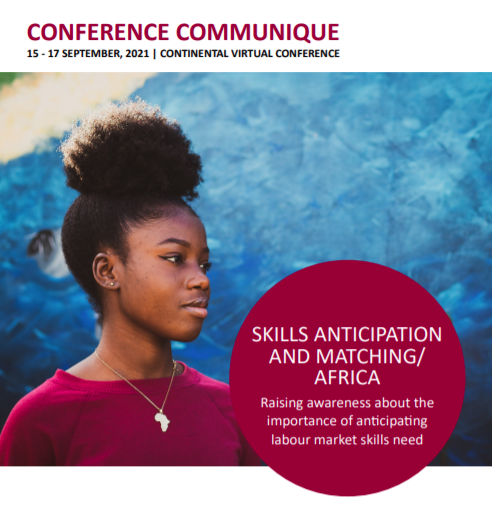
The communique summarizes the key agreements and actions to guide labour market actors to identify, plan, and address future skills needs as a means to better align skills demand and skills supply.
The objective of the Continental Conference was to raise awareness about the strategic role that skills anticipation and matching plays in guiding labour market actors to identify, plan, and address future skills needs as a means to avoid potential gaps between skills demand and skills supply.
Skills anticipation is an integral part of Labour Market Information Systems (LMIS), and a strategic and systematic process through which actors in the labour market address the discrepancies between skills demand and skills supply. The Conference highlighted the drivers of change across the world of work and their impact on skills development and inclusive economic development. Through the Conference, the AUC and AUDA-NEPAD sought to position skills anticipation as one of the tools to attain the Africa Agenda 2063’s aspiration for an ‘Africa whose development is people-driven, relying on the potential of its people.’
The three-day conference brought together over two hundred (200) participants representing 40 African countries, namely Algeria, Benin, Botswana, Burundi, Carpe Verde, Cameroon, DRC, Dote D Ivoire. Djibouti, Egypt, Eswatini, Ethiopia, Gabon, Gambia, Ghana, Kenya, Lesotho, Libya, Madagascar, Malawi, Morocco, Mauritania, Mauritius, Mozambique, Namibia, Niger, Nigeria, Rwanda, Senegal, Seychelles, Somalia, South Africa, South Sudan, Sudan, Tanzania, Togo, Tunisia, Uganda, Zambia, and Zimbabwe, as well as fifty (50) participants from non-African countries, including Canada, Cambodia, Germany, India, Italy, Kosovo, Mexico, Netherlands, Switzerland, and Vietnam, among others.
Conference participants reflected on the ecosystem of the labour market and skills development stakeholders, such as key labour market actors on the African continent and beyond, high-level government representatives, apex employer organizations, workers’ organizations, labour market and skills development practitioners, representatives from national labour market information and statistics organisations, academia, labour policy research institutions, civil society, and development partner organizations. Youth and their specific skills related needs were also represented. The Conference format was structured around four interrelated components:
i.) Virtual fair showcasing tools, knowledge products, country level experiences and comparable practices on skills anticipation and LMIS;
ii.) Opening plenary and keynote address;
iii. ) Panel discussion; and
iv.) Thematic sessions:
a) reskilling and upskilling needs arising from the impact of COVID-19 on the labour market; and
b) strengthening skills needs anticipation and LMIS and practices.
Download conference communique below:


